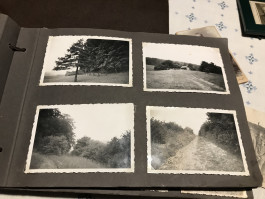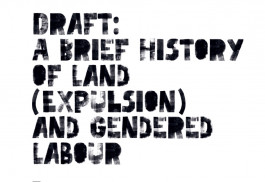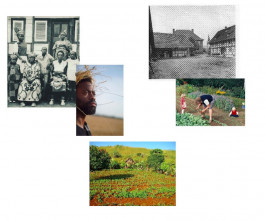
colonial ghosts, 4 cows, fine lines
Out of my family of farmers, Friedrich was the one with the thwarted attempt to join the bourgeoisie. It was Friedrich, born in 1896, that left the tales of an extravagant lifestyle such as his passion for attending horse races but also his dreams of emigrating to the former German colonies. From what I know, I assume he wished for the life as a settler, a colonial master, passed on through book titles from his collection such as Ich suchte Land in Afrika[i].
I stumbled across this book amongst others in a tucked away box while helping to clean out a cupboard at my family’s farm five years ago. It made me wonder about what role such fantasies of faraway places played among farmers in historical colonialism. Farmers are said to have a local rootedness, but how is this then connected to the dream of conquering foreign lands and dominating its people? I am still sometimes in doubt about the reasons behind my own motivation to research this. I believe my interest in this part of my family history comes from a drive to look at the less obvious legacies of a violent past.
As many of us work towards a cultural shift, attempting to connect differently with the earth and land, past political ideologies which surrounded rurality in Germany can come frighteningly close when we begin from our own family background. For a long time, Friedrich and his later partner Anna were just names I had heard. Anna was my great-grandfather's sister. Stories about the two of them were very present at the countless family gatherings at my uncle’s farm throughout my childhood, youth and adulthood. Flavored by long coffee tables and heavy German cuisine, these gatherings were the more festive of the occasions during regular visits to the farm.The more mundane ones were herding cows, harvesting apples, and working around the house. In the rural milieu, going back to the family farm (as far as there are no borders in the way) seems to get almost inevitably rehearsed. It maintains ties by following its own temporal logic. To me, these visits became a habit to a point I did not know if I visited the people or the place. Over the years, I have grown an interest in how this differs from other variants of class and what else follows from it.
As far as I know, Friedrich and Anna were quite "normal" Nazis. This means that, as in many families, a cloak of silence lies over details of their involvement in war and persecution. Attempts to research do not yield much information. Tales of Friedrich and Anna tell their stories, habits and desires, not their political affiliation. Yet how does this affect our perception of our Nazi relatives? What effects do these familiar details have on those who tell and those who listen?
Friedrich was the son of wealthy farmers from Lower Saxony in western Germany. When Friedrich was about 8 years old, his parents sold their farm to live a different life from the proceeds in the small town of Goslar, where the best schooling was expected for Friedrich. This decision sets them apart and, even today, it is the first thing you will hear about Friedrich from anyone in my family. Selling off land at this scale went against all logics of inheritance where farmsteads and fields would be handed from father to son in a strictly patriarchal order. Friedrich’s family, in contrast, entered bourgeois circles and undertook travels. In the stories that circulate about them among my relatives no travel destinations appear: they could have journeyed to the United States or to southern Germany. It was the fact that they decided to travel without a specific purpose at all that makes them stand out in the memory. Traveling per se marks them as different, distancing them from the rural milieu.
Friedrich went to grammar school and after that probably to some kind of vocational university. His parents’ attempt to improve their social status, however, came to an abrupt halt with the hyperinflation after World War I starting in 1919, which pulverized the capital they had accrued. Knowing he would inherit no land and no significant sum of money would have been mortifying for young Friedrich, or so we can assume. However, with his good education, he secured work as a manager for large agricultural holdings in Northern Germany throughout the 1920s.
Undoubtedly, Friedrich would have had the perfect profile to become a settler within the system of German colonialism. Other book titles he owned included The Struggle for Our Protectorates[ii];The African Today and Tomorrow[iii].Despite the so-called West Africa Conference of 1884/1885 being decided in Berlin, the history of colonial expansion was lived out by the rural population to a large extent. An often overlooked fact is that in the decades of general colonial enthusiasm, it was men from the countryside – often the second and third sons of the farms – who had the knowledge and motivation to go to the German colonies, which were heavily oriented toward plantation farming.
Desires for large land ownership and for the associated social advancement were accompanied with fictions of vast, unpopulated areas and superiority over the local population. Susanne Zantop describes the desire for colonial possession that grew in Germany and often included almost familial cohabitation with enslaved people, as "colonial fantasies"[iv]. These were already culturally formative for the emerging German national identity before the founding of the nation state in 1871. Colonialism continued in the collective consciousness, with or without the colonies.
At the height of the expansion of the German colonial empire in 1914, Friedrich was still too young at 18. After the loss of the First World War, the territories seen as German were passed to Great Britain, France, Belgium, which continued their exploitation in a slightly modified way. In the Germany of the Weimar Republic, the desire for colonial possession shifted to the cultural sphere once more as it remained outside the reach of political action. As German elites lost access to colonies, some went back to fantasizing about it like an inhibited need. At the same time, demands for a "return" of the colonies (to Germany) played a role in almost all political parties of the Weimar Republic.
In 1934, Friedrich and Anna were married. Anna was the youngest daughter of a farming family from Kreiensen, who had the improbable good fortune to inherit a farm with arable land herself from her father's second marriage. The couple now devoted themselves to farming, which meant a change in lifestyle, at least for Friedrich. The most shared anecdote that has been handed down tells how they were given four cows by relatives to start with but they did not know how to milk them themselves. So they secretly asked the village milker to learn from him.
Was the change of career a step backwards? Ideologically but also geographically, one can assume that quite the opposite was the case. Anna and Friedrich could consider themselves at the center of a movement that was an important part of the establishment of the National Socialist state after 1933. Within the scope of the blood-and-soil ideology, which asserted the unity of an imagined racially defined ethnic body with its settlement area, the National Socialists made Friedrich's childhood town of Goslar, the "Reichsbauernstadt" (Peasant Capital of the Reich). Here, central torchlight parades of the SS and oaths of allegiance took place annually around the time of the harvest festival. State-set prices above world market levels also made farming quite profitable in the years that followed.
Friedrich’s and Anna’s attempt to connect to land in a novel way began about 90 years ago. I hope that sharing these aspects on the political contexts of my own inheritance contributes to a more nuanced perspective on how we may think about reconnecting to land today.
[i]Translation: “I Sought Land in Africa”.The book published in 1942 by German colonist, businessman and farmer Heinrich Schulte-Altenroxel is a colonial-imperialist memoir. Written in the years before 1942 it anticipates a return of Germany as a colonial power after a victory in WWII. It blends fragments of a radical ideology of race with the colonial supremacist thinking of the German Empire. Full citation: Schulte-Altenroxel, H. (1942): Ich suchte Land in Afrika. Erinnerungen eines Kolonialpioniers im nördlichen Transvaal.Verlag E.A. Seemann, Leipzig.
[ii]A colonial-revisionist propaganda book that seeks to re-establish Germany as a colonial power, romanticizes a supposedly just German rule over the populations of its colonies. The authors attempt to minimize the responsibility of German authorities for the Herero and Nama genocide, a campaign of ethnic extermination and collective punishment waged by the German Empire against the Herero (Ovaherero) and the Nama in German South West Africa (now Namibia) between 1904 and 1908. Full citation: P. Jos, M. Abs (1926): Der Kampf um unsere Schutzgebiete.Unsere Kolonien eins und jetzt. Friedrich Floeder Verlag, Düsseldorf.
[iii]A bookof scientific racismby Diedrich Westermann, founder of African Linguistics at Friedrich Wilhelm University (later Humboldt University) ofBerlin,that also claims to cover languages, anthropology and history of the African continent. Westermann published it with a newspaper press which was owned and run by the National Socialist German Workers' Party (NSDAP). Full citation: Westermann, Dietrich (1937): Der Afrikaner heute und morgen. 2. Auflage. Essener Verlagsanstalt, Essen.
[i]Translation: “I Sought Land in Africa”.The book published in 1942 by German colonist, businessman and farmer Heinrich Schulte-Altenroxel is a colonial-imperialist memoir. Written in the years before 1942 it anticipates a return of Germany as a colonial power after a victory in WWII. It blends fragments of a radical ideology of race with the colonial supremacist thinking of the German Empire. Full citation: Schulte-Altenroxel, H. (1942): Ich suchte Land in Afrika. Erinnerungen eines Kolonialpioniers im nördlichen Transvaal.Verlag E.A. Seemann, Leipzig.
[ii]A colonial-revisionist propaganda book that seeks to re-establish Germany as a colonial power, romanticizes a supposedly just German rule over the populations of its colonies. The authors attempt to minimize the responsibility of German authorities for the Herero and Nama genocide, a campaign of ethnic extermination and collective punishment waged by the German Empire against the Herero (Ovaherero) and the Nama in German South West Africa (now Namibia) between 1904 and 1908. Full citation: P. Jos, M. Abs (1926): Der Kampf um unsere Schutzgebiete.Unsere Kolonien eins und jetzt. Friedrich Floeder Verlag, Düsseldorf.
[iii]A bookof scientific racismby Diedrich Westermann, founder of African Linguistics at Friedrich Wilhelm University (later Humboldt University) ofBerlin,that also claims to cover languages, anthropology and history of the African continent. Westermann published it with a newspaper press which was owned and run by the National Socialist German Workers' Party (NSDAP). Full citation: Westermann, Dietrich (1937): Der Afrikaner heute und morgen. 2. Auflage. Essener Verlagsanstalt, Essen.
[iv]Susanne Zantop, Colonial Fantasies: Conquest, Family, and Nation in Precolonial Germany,Duke University Press, 1997.
Andreas Doepke
Berlin, 2022
Similar articles

colonial ghosts, 4 cows, fine lines
Andreas Doepke
Berlin, 2022
Out of my family of farmers, Friedrich was the one with the thwarted attempt to join the bourgeoisie. It was Friedrich, born in 1896, that left the tales of an extravagant lifestyle such as his passion for attending horse races but also his dreams of emigrating to the former German colonies. From what I know, I assume he wished for the life as a settler, a colonial master, passed on through book titles from his collection such as Ich suchte Land in Afrika[i].
I stumbled across this book amongst others in a tucked away box while helping to clean out a cupboard at my family’s farm five years ago. It made me wonder about what role such fantasies of faraway places played among farmers in historical colonialism. Farmers are said to have a local rootedness, but how is this then connected to the dream of conquering foreign lands and dominating its people? I am still sometimes in doubt about the reasons behind my own motivation to research this. I believe my interest in this part of my family history comes from a drive to look at the less obvious legacies of a violent past.
As many of us work towards a cultural shift, attempting to connect differently with the earth and land, past political ideologies which surrounded rurality in Germany can come frighteningly close when we begin from our own family background. For a long time, Friedrich and his later partner Anna were just names I had heard. Anna was my great-grandfather's sister. Stories about the two of them were very present at the countless family gatherings at my uncle’s farm throughout my childhood, youth and adulthood. Flavored by long coffee tables and heavy German cuisine, these gatherings were the more festive of the occasions during regular visits to the farm.The more mundane ones were herding cows, harvesting apples, and working around the house. In the rural milieu, going back to the family farm (as far as there are no borders in the way) seems to get almost inevitably rehearsed. It maintains ties by following its own temporal logic. To me, these visits became a habit to a point I did not know if I visited the people or the place. Over the years, I have grown an interest in how this differs from other variants of class and what else follows from it.
As far as I know, Friedrich and Anna were quite "normal" Nazis. This means that, as in many families, a cloak of silence lies over details of their involvement in war and persecution. Attempts to research do not yield much information. Tales of Friedrich and Anna tell their stories, habits and desires, not their political affiliation. Yet how does this affect our perception of our Nazi relatives? What effects do these familiar details have on those who tell and those who listen?
Friedrich was the son of wealthy farmers from Lower Saxony in western Germany. When Friedrich was about 8 years old, his parents sold their farm to live a different life from the proceeds in the small town of Goslar, where the best schooling was expected for Friedrich. This decision sets them apart and, even today, it is the first thing you will hear about Friedrich from anyone in my family. Selling off land at this scale went against all logics of inheritance where farmsteads and fields would be handed from father to son in a strictly patriarchal order. Friedrich’s family, in contrast, entered bourgeois circles and undertook travels. In the stories that circulate about them among my relatives no travel destinations appear: they could have journeyed to the United States or to southern Germany. It was the fact that they decided to travel without a specific purpose at all that makes them stand out in the memory. Traveling per se marks them as different, distancing them from the rural milieu.
Friedrich went to grammar school and after that probably to some kind of vocational university. His parents’ attempt to improve their social status, however, came to an abrupt halt with the hyperinflation after World War I starting in 1919, which pulverized the capital they had accrued. Knowing he would inherit no land and no significant sum of money would have been mortifying for young Friedrich, or so we can assume. However, with his good education, he secured work as a manager for large agricultural holdings in Northern Germany throughout the 1920s.
Undoubtedly, Friedrich would have had the perfect profile to become a settler within the system of German colonialism. Other book titles he owned included The Struggle for Our Protectorates[ii];The African Today and Tomorrow[iii].Despite the so-called West Africa Conference of 1884/1885 being decided in Berlin, the history of colonial expansion was lived out by the rural population to a large extent. An often overlooked fact is that in the decades of general colonial enthusiasm, it was men from the countryside – often the second and third sons of the farms – who had the knowledge and motivation to go to the German colonies, which were heavily oriented toward plantation farming.
Desires for large land ownership and for the associated social advancement were accompanied with fictions of vast, unpopulated areas and superiority over the local population. Susanne Zantop describes the desire for colonial possession that grew in Germany and often included almost familial cohabitation with enslaved people, as "colonial fantasies"[iv]. These were already culturally formative for the emerging German national identity before the founding of the nation state in 1871. Colonialism continued in the collective consciousness, with or without the colonies.
At the height of the expansion of the German colonial empire in 1914, Friedrich was still too young at 18. After the loss of the First World War, the territories seen as German were passed to Great Britain, France, Belgium, which continued their exploitation in a slightly modified way. In the Germany of the Weimar Republic, the desire for colonial possession shifted to the cultural sphere once more as it remained outside the reach of political action. As German elites lost access to colonies, some went back to fantasizing about it like an inhibited need. At the same time, demands for a "return" of the colonies (to Germany) played a role in almost all political parties of the Weimar Republic.
In 1934, Friedrich and Anna were married. Anna was the youngest daughter of a farming family from Kreiensen, who had the improbable good fortune to inherit a farm with arable land herself from her father's second marriage. The couple now devoted themselves to farming, which meant a change in lifestyle, at least for Friedrich. The most shared anecdote that has been handed down tells how they were given four cows by relatives to start with but they did not know how to milk them themselves. So they secretly asked the village milker to learn from him.
Was the change of career a step backwards? Ideologically but also geographically, one can assume that quite the opposite was the case. Anna and Friedrich could consider themselves at the center of a movement that was an important part of the establishment of the National Socialist state after 1933. Within the scope of the blood-and-soil ideology, which asserted the unity of an imagined racially defined ethnic body with its settlement area, the National Socialists made Friedrich's childhood town of Goslar, the "Reichsbauernstadt" (Peasant Capital of the Reich). Here, central torchlight parades of the SS and oaths of allegiance took place annually around the time of the harvest festival. State-set prices above world market levels also made farming quite profitable in the years that followed.
Friedrich’s and Anna’s attempt to connect to land in a novel way began about 90 years ago. I hope that sharing these aspects on the political contexts of my own inheritance contributes to a more nuanced perspective on how we may think about reconnecting to land today.
[i]Translation: “I Sought Land in Africa”.The book published in 1942 by German colonist, businessman and farmer Heinrich Schulte-Altenroxel is a colonial-imperialist memoir. Written in the years before 1942 it anticipates a return of Germany as a colonial power after a victory in WWII. It blends fragments of a radical ideology of race with the colonial supremacist thinking of the German Empire. Full citation: Schulte-Altenroxel, H. (1942): Ich suchte Land in Afrika. Erinnerungen eines Kolonialpioniers im nördlichen Transvaal.Verlag E.A. Seemann, Leipzig.
[ii]A colonial-revisionist propaganda book that seeks to re-establish Germany as a colonial power, romanticizes a supposedly just German rule over the populations of its colonies. The authors attempt to minimize the responsibility of German authorities for the Herero and Nama genocide, a campaign of ethnic extermination and collective punishment waged by the German Empire against the Herero (Ovaherero) and the Nama in German South West Africa (now Namibia) between 1904 and 1908. Full citation: P. Jos, M. Abs (1926): Der Kampf um unsere Schutzgebiete.Unsere Kolonien eins und jetzt. Friedrich Floeder Verlag, Düsseldorf.
[iii]A bookof scientific racismby Diedrich Westermann, founder of African Linguistics at Friedrich Wilhelm University (later Humboldt University) ofBerlin,that also claims to cover languages, anthropology and history of the African continent. Westermann published it with a newspaper press which was owned and run by the National Socialist German Workers' Party (NSDAP). Full citation: Westermann, Dietrich (1937): Der Afrikaner heute und morgen. 2. Auflage. Essener Verlagsanstalt, Essen.
[i]Translation: “I Sought Land in Africa”.The book published in 1942 by German colonist, businessman and farmer Heinrich Schulte-Altenroxel is a colonial-imperialist memoir. Written in the years before 1942 it anticipates a return of Germany as a colonial power after a victory in WWII. It blends fragments of a radical ideology of race with the colonial supremacist thinking of the German Empire. Full citation: Schulte-Altenroxel, H. (1942): Ich suchte Land in Afrika. Erinnerungen eines Kolonialpioniers im nördlichen Transvaal.Verlag E.A. Seemann, Leipzig.
[ii]A colonial-revisionist propaganda book that seeks to re-establish Germany as a colonial power, romanticizes a supposedly just German rule over the populations of its colonies. The authors attempt to minimize the responsibility of German authorities for the Herero and Nama genocide, a campaign of ethnic extermination and collective punishment waged by the German Empire against the Herero (Ovaherero) and the Nama in German South West Africa (now Namibia) between 1904 and 1908. Full citation: P. Jos, M. Abs (1926): Der Kampf um unsere Schutzgebiete.Unsere Kolonien eins und jetzt. Friedrich Floeder Verlag, Düsseldorf.
[iii]A bookof scientific racismby Diedrich Westermann, founder of African Linguistics at Friedrich Wilhelm University (later Humboldt University) ofBerlin,that also claims to cover languages, anthropology and history of the African continent. Westermann published it with a newspaper press which was owned and run by the National Socialist German Workers' Party (NSDAP). Full citation: Westermann, Dietrich (1937): Der Afrikaner heute und morgen. 2. Auflage. Essener Verlagsanstalt, Essen.
[iv]Susanne Zantop, Colonial Fantasies: Conquest, Family, and Nation in Precolonial Germany,Duke University Press, 1997.
hn Lyonga,
date and place
Similar projects



